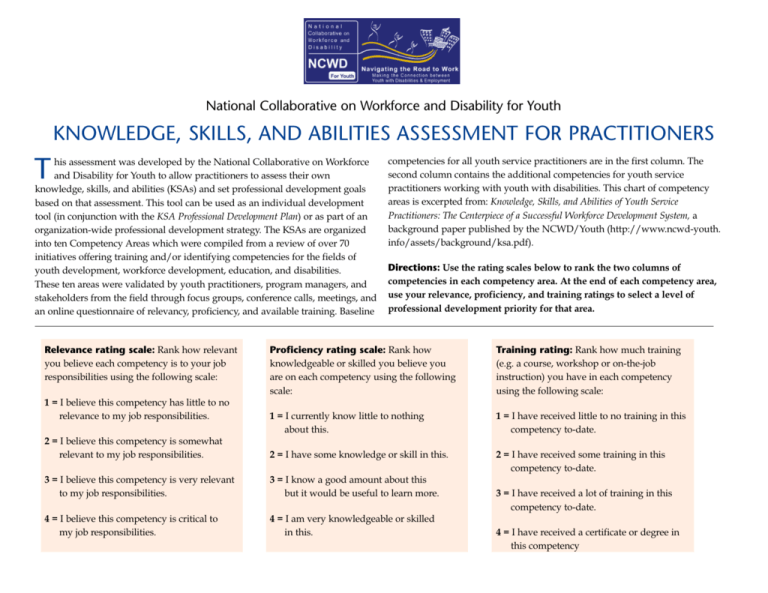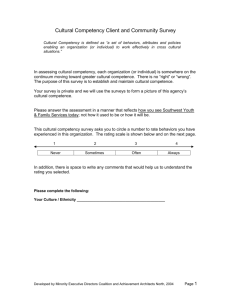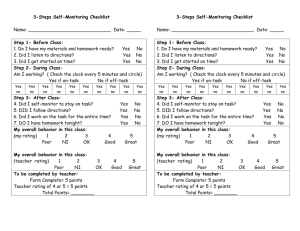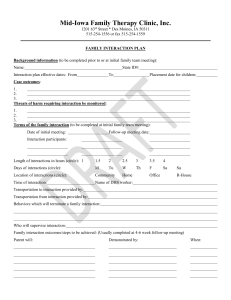KNOWLEDGE, SKILLS, AND ABILITIES ASSESSMENT FOR
advertisement

National Collaborative on Workforce and Disability for Youth KNOWLEDGE, SKILLS, AND ABILITIES ASSESSMENT FOR PRACTITIONERS his assessment was developed by the National Collaborative on Workforce and Disability for Youth to allow practitioners to assess their own knowledge, skills, and abilities (KSAs) and set professional development goals based on that assessment. This tool can be used as an individual development tool (in conjunction with the KSA Professional Development Plan) or as part of an organization-wide professional development strategy. The KSAs are organized into ten Competency Areas which were compiled from a review of over 70 initiatives offering training and/or identifying competencies for the fields of youth development, workforce development, education, and disabilities. These ten areas were validated by youth practitioners, program managers, and stakeholders from the field through focus groups, conference calls, meetings, and an online questionnaire of relevancy, proficiency, and available training. Baseline T Relevance rating scale: Rank how relevant you believe each competency is to your job responsibilities using the following scale: 1 = I believe this competency has little to no relevance to my job responsibilities. 2 = I believe this competency is somewhat relevant to my job responsibilities. competencies for all youth service practitioners are in the first column. The second column contains the additional competencies for youth service practitioners working with youth with disabilities. This chart of competency areas is excerpted from: Knowledge, Skills, and Abilities of Youth Service Practitioners: The Centerpiece of a Successful Workforce Development System, a background paper published by the NCWD/Youth (http://www.ncwd-youth. info/assets/background/ksa.pdf). Directions: Use the rating scales below to rank the two columns of competencies in each competency area. At the end of each competency area, use your relevance, proficiency, and training ratings to select a level of professional development priority for that area. Proficiency rating scale: Rank how knowledgeable or skilled you believe you are on each competency using the following scale: Training rating: Rank how much training (e.g. a course, workshop or on-the-job instruction) you have in each competency using the following scale: 1 = I currently know little to nothing about this. 1 = I have received little to no training in this competency to-date. 2 = I have some knowledge or skill in this. 2 = I have received some training in this competency to-date. 3 = I believe this competency is very relevant to my job responsibilities. 3 = I know a good amount about this but it would be useful to learn more. 4 = I believe this competency is critical to my job responsibilities. 4 = I am very knowledgeable or skilled in this. 3 = I have received a lot of training in this competency to-date. 4 = I have received a certificate or degree in this competency Competency Area #1: Knowledge of the Field KSA’s Needed to Effectively Serve All Youth Include: Relevance Rating 1 2 3 4 (circle one) Proficiency Rating 1 2 3 4 (circle one) Training Rating 1 2 3 4 (circle one) • Knowledge of youth development theory, adolescent and human development • Understanding of youth rights and laws including labor, curfew, and attendance • Knowledge of self as a youth development worker, including professional ethics and boundaries, confidentiality, and professional development needs and opportunities Additional KSA’s Needed to Effectively Serve Youth w/Disabilities Include: Relevance Rating 1 2 3 4 (circle one) Proficiency Rating 1 2 3 4 (circle one) Training Rating 1 2 3 4 (circle one) • Understanding of the values and history of the disability field • Understanding of disability laws including Section 504 of the Rehabilitation Act (Section 504), Americans with Disabilities Act (ADA), Individual with Disabilities Education Act (IDEA), and Ticket to Work and Work Incentives Improvement Act (TWWIIA) • Knowledge of key concepts and processes including Individualized Education Plan (IEP), Individualized Plan for Employment (IPE), transition, due process procedures, parents’ rights, informed choice, self determination, universal access, and reasonable accommodations • Understanding of privacy and confidentiality rights as they relate to disability disclosure _______ High Priority: based on my assessment above, I would like further professional development in this area immediately. _______ Medium Priority: based on my assessment above, I could use further professional development in this area within the next year. _______ Low Priority: based on my assessment above, I do not currently need professional development in this area. Competency Area #2: Communication with Youth KSA’s Needed to Effectively Serve All Youth Include: Relevance Rating 1 2 3 4 (circle one) Proficiency Rating 1 2 3 4 (circle one) Training Rating 1 2 3 4 (circle one) • Respect and caring for all youth, including the ability to be open minded and nonjudgmental, develop trusting relationships, and maintain awareness of diversity and youth culture • Ability to recognize and address need for intervention (e.g. drug or alcohol abuse, domestic abuse or violence, and depression) • Ability to advocate for, motivate, recruit, and engage youth Additional KSA’s Needed to Effectively Serve Youth w/Disabilities Include: Relevance Rating 1 2 3 4 (circle one) Proficiency Rating 1 2 3 4 (circle one) Training Rating 1 2 3 4 (circle one) • Knowledge of issues and trends affecting youth with disabilities (e.g. low expectations, attitudinal or environmental barriers, need for social integration) • Understanding of disability awareness, sensitivity and culture • Understanding of how to communicate with youth with various physical, sensory, psychiatric, and cognitive disabilities _______ High Priority: based on my assessment above, I would like further professional development in this area immediately. _______ Medium Priority: based on my assessment above, I could use further professional development in this area within the next year. _______ Low Priority: based on my assessment above, I do not currently need professional development in this area. Competency Area #3: Assessment and Individualized Planning KSA’s Needed to Effectively Serve All Youth Include: Relevance Rating 1 2 3 4 (circle one) Proficiency Rating 1 2 3 4 (circle one) Training Rating 1 2 3 4 (circle one) • Ability to facilitate person-centered planning, including the ability to assess goals, interests, past experience, learning styles, academic skills, assets, independent living skills, and needs (e.g. transportation, etc) • Ability to involve youth in their own planning process by helping youth to set realistic goals and action steps, make informed choices, exercise selfdetermination, and actively participate in own development (includes financial/benefits planning and educational requirements) • Knowledge of various assessment tools and strategies and ability to administer assessments (or make referrals, as needed) Additional KSA’s Needed to Effectively Serve Youth w/Disabilities Include: Relevance Rating 1 2 3 4 (circle one) Proficiency Rating 1 2 3 4 (circle one) Training Rating 1 2 3 4 (circle one) • Ability to ensure appropriate assessment of young peoples’ disabilities (in-house or through referrals, as necessary) • Understanding how to use information from assessments and records and recognize implications for education and employment, including any potential need for accommodations and assistive technology • Ability to assess independent community / living skills and needs, including accommodations and supports • Understanding of benefits planning, includes Social Security income and health benefits and their relation to working • Ability to track progress and change plans as needed _______ High Priority: based on my assessment above, I would like further professional development in this area immediately. _______ Medium Priority: based on my assessment above, I could use further professional development in this area within the next year. _______ Low Priority: based on my assessment above, I do not currently need professional development in this area. Competency Area #4: Relationship to Family and Community KSA’s Needed to Effectively Serve All Youth Include: Relevance Rating 1 2 3 4 (circle one) Proficiency Rating 1 2 3 4 (circle one) • Engage/build relationships with family members or other significant persons • Resource mapping/ability to connect youth to community institutions, resources, and supportive adults • Ability to engage youth in community service and leadership activities Training Rating 1 2 3 4 (circle one) Additional KSA’s Needed to Effectively Serve Youth w/Disabilities Include: Relevance Rating 1 2 3 4 (circle one) Proficiency Rating 1 2 3 4 (circle one) • Involving families, guardians, and advocates including connections to disability-specific resources and groups • Community resources, including disability-specific resources and organizations Training Rating 1 2 3 4 (circle one) _______ High Priority: based on my assessment above, I would like further professional development in this area immediately. _______ Medium Priority: based on my assessment above, I could use further professional development in this area within the next year. _______ Low Priority: based on my assessment above, I do not currently need professional development in this area. Competency Area #5: Workforce Preparation KSA’s Needed to Effectively Serve All Youth Include: Relevance Rating 1 2 3 4 (circle one) Proficiency Rating 1 2 3 4 (circle one) Training Rating 1 2 3 4 (circle one) • Ability to facilitate job readiness skill-building and assess employability strengths/barriers • Ability to teach job search skills, including use of technology and the internet Additional KSA’s Needed to Effectively Serve Youth w/Disabilities Include: Relevance Rating 1 2 3 4 (circle one) • Ability to coach youth, assist in job maintenance, and provide follow-up support Proficiency Rating 1 2 3 4 (circle one) • Ability to involve employers in preparation process Training Rating 1 2 3 4 (circle one) • Ability to match youth with appropriate jobs and careers, including job analysis and skills standards • Ability to conduct job analysis, matching, customizing, and carving for youth with disabilities, including accommodations, supports and modifications • Knowledge of support required to place youth in jobs, including what employers need to know about reasonable accommodations, undue burden, assistive technology, funding streams, and tax incentives _______ High Priority: based on my assessment above, I would like further professional development in this area immediately. _______ Medium Priority: based on my assessment above, I could use further professional development in this area within the next year. _______ Low Priority: based on my assessment above, I do not currently need professional development in this area. Competency Area #6: Career Exploration KSA’s Needed to Effectively Serve All Youth Include: Relevance Rating 1 2 3 4 (circle one) Proficiency Rating 1 2 3 4 (circle one) • Knowledge of technology and online search skills • Knowledge of tools and processes for career exploration • Ability to engage employers in career exploration • Knowledge of workplace and labor market trends Training Rating 1 2 3 4 (circle one) Additional KSA’s Needed to Effectively Serve Youth w/Disabilities Include: Relevance Rating 1 2 3 4 (circle one) Proficiency Rating 1 2 3 4 (circle one) • Knowledge of workplace and labor market trends, including options for youth with disabilities such as supported employment, customized employment, or self-employment Training Rating 1 2 3 4 (circle one) _______ High Priority: based on my assessment above, I would like further professional development in this area immediately. _______ Medium Priority: based on my assessment above, I could use further professional development in this area within the next year. _______ Low Priority: based on my assessment above, I do not currently need professional development in this area. Competency Area #7: Relationships with Employers and Between Employer & Employee KSA’s Needed to Effectively Serve All Youth Include: Relevance Rating 1 2 3 4 (circle one) Proficiency Rating 1 2 3 4 (circle one) Training Rating 1 2 3 4 (circle one) • Ability to develop relationships with employers • Ability to communicate effectively with employers • Ability to mediate/resolve conflicts • Ability to engage employers in program design and delivery • Ability to train employers in how to work with and support young people • Customer service skills Additional KSA’s Needed to Effectively Serve Youth w/Disabilities Include: Relevance Rating 1 2 3 4 (circle one) Proficiency Rating 1 2 3 4 (circle one) Training Rating 1 2 3 4 (circle one) • Ability to identify, recruit, and provide support to employers who hire youth with disabilities • Ability to advocate for youth with disabilities with employers including negotiating job design, job customization, and job carving • Ability to train employers and their staff in how to work with and support young people, including providing disability awareness training and information about universal access and design, reasonable accommodations, auxiliary aids and services for youth with disabilities _______ High Priority: based on my assessment above, I would like further professional development in this area immediately. _______ Medium Priority: based on my assessment above, I could use further professional development in this area within the next year. _______ Low Priority: based on my assessment above, I do not currently need professional development in this area. Competency Area #8: Access to Resources KSA’s Needed to Effectively Serve All Youth Include: Relevance Rating 1 2 3 4 (circle one) Proficiency Rating 1 2 3 4 (circle one) Training Rating 1 2 3 4 (circle one) • Ability to identify a range of community resources (people, places, things, & money) that can assist youth • Ability to create relationships and network with other community agencies and potential partners • Ability to market own program as a valuable resource to community and a viable partner • Ability to build collaborative relationships and manage partnerships • Knowledge about different funding streams for youth Additional KSA’s Needed to Effectively Serve Youth w/Disabilities Include: Relevance Rating 1 2 3 4 (circle one) • Knowledge of community intermediary organizations to assist with disability-specific supports and resources Proficiency Rating 1 2 3 4 (circle one) Training Rating 1 2 3 4 (circle one) _______ High Priority: based on my assessment above, I would like further professional development in this area immediately. _______ Medium Priority: based on my assessment above, I could use further professional development in this area within the next year. _______ Low Priority: based on my assessment above, I do not currently need professional development in this area. Competency Area #9: Program Design and Delivery KSA’s Needed to Effectively Serve All Youth Include: Relevance Rating 1 2 3 4 (circle one) Proficiency Rating 1 2 3 4 (circle one) Training Rating 1 2 3 4 (circle one) • Knowledge of workforce development system, including technology of workforce development (service management, performance measures, and assessment) Additional KSA’s Needed to Effectively Serve Youth w/Disabilities Include: Relevance Rating 1 2 3 4 (circle one) • Ability to work with groups, foster teamwork, and develop leadership and followership among youth Proficiency Rating 1 2 3 4 (circle one) • Ability to design programs using best practices (considering age, stage, and cultural appropriateness) Training Rating 1 2 3 4 (circle one) • Ability to manage programs and budgets • Service management skills, including how to set measurable goals with tangible outcomes • Ability to access resources from special education, vocational rehabilitation, community rehabilitation programs, disability income support work incentives, and other disability-specific programs • Knowledge of universal access and design, reasonable accommodation, auxiliary aids, and services • Ability to evaluate and adjust programs based on outcome measurement and data _______ High Priority: based on my assessment above, I would like further professional development in this area immediately. _______ Medium Priority: based on my assessment above, I could use further professional development in this area within the next year. _______ Low Priority: based on my assessment above, I do not currently need professional development in this area. Competency Area #10: Administrative Skills KSA’s Needed to Effectively Serve All Youth Include: Relevance Rating 1 2 3 4 (circle one) Proficiency Rating 1 2 3 4 (circle one) Training Rating 1 2 3 4 (circle one) • Ability to complete referrals and service summaries using common reporting formats and requirements • Written and verbal communication skills • Time management skills • Strong interpersonal skills/ability to work within a team Additional KSA’s Needed to Effectively Serve Youth w/Disabilities Include: Relevance Rating 1 2 3 4 (circle one) • Ability to complete disability-specific referrals and service summaries, such as IEP, transition plan, IPE, and In-service Work Plan (IWP) Proficiency Rating 1 2 3 4 (circle one) Training Rating 1 2 3 4 (circle one) _______ High Priority: based on my assessment above, I would like further professional development in this area immediately. _______ Medium Priority: based on my assessment above, I could use further professional development in this area within the next year. _______ Low Priority: based on my assessment above, I do not currently need professional development in this area. National Collaborative on Workforce and Disability for Youth SUMMARY OF ASSESSMENT & PROFESSIONAL DEVELOPMENT PLANNING STRENGTHS: The table above lists competencies in 10 Competency Areas. Looking back over the list, which are the three Competency Areas you feel are your strengths (an area where you could possibly give training to others)? AREAS FOR PROFESSIONAL DEVELOPMENT: Looking back over the list again, which are the three Competency Areas where you would most like to improve your knowledge, skills, and abilities? (You may want to start with those areas you marked as a “high priority”.) 1)__________________________________________________________________________________________________ 1)__________________________________________________________________________________________________ 2)__________________________________________________________________________________________________ 2)______________________________________________________________________ 3)__________________________________________________________________________________________________ 3)__________________________________________________________________________________________________ NEXT STEPS: • Involve others— It may be a good idea to ask a colleague or supervisor to assess you in the 10 Competency Areas. This can be extremely helpful in getting a true picture of your own competencies and areas for development. You may also want to share your professional goals and steps to achieve them in order to get guidance and support (e.g. time off or funding for training) • Share your knowledge— You may want to revisit your areas of strength and think about ways you can share your KSAs in this area with others at your organization, your local network, or the field at large (e.g. a staff meeting, regional conference, or national publication.). • Gain knowledge— You should use the Knowledge, Skills, & Abilities Professional Development Plan for Practitioners (or your organization’s professional development plan) to identify ways to build your strengths in the three areas you selected for professional development. Professional development may include an on-site training, a web-based course, selected readings, job shadowing, or selfdefined experiential learning activities. Be sure to keep a journal or other documentation and note your progress on your professional development plan. It is recommended that you review your professional development plan every three to six months to review your progress and update your goals. For More Information, Contact: National Collaborative On Workforce and Disability for Youth 1-877-871-0744 (toll free) 1-877-871-0665 (TTY toll free) contact@ncwd-youth.info www.ncwd-youth.info This document was developed by the National Collaborative on Workforce and Disability for Youth (NCWD/Youth), funded by a grant/contract/cooperative agreement from the U.S. Department of Labor, Office of Disability Employment Policy (Number #E-9-4-1-0070). The opinions expressed herein do not necessarily reflect the position or policy of the U.S. Department of Labor. Nor does mention of trade names, commercial products, or organizations imply the endorsement by the U.S. Department of Labor.



